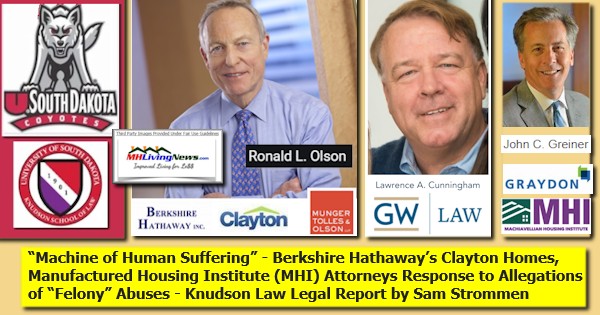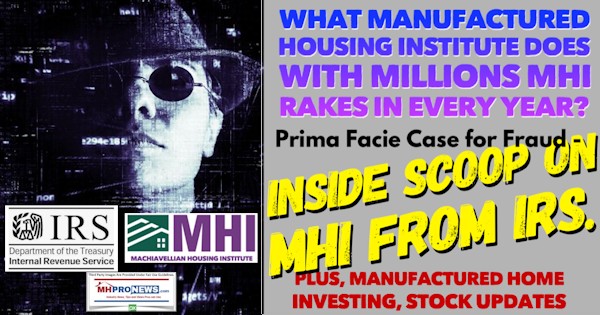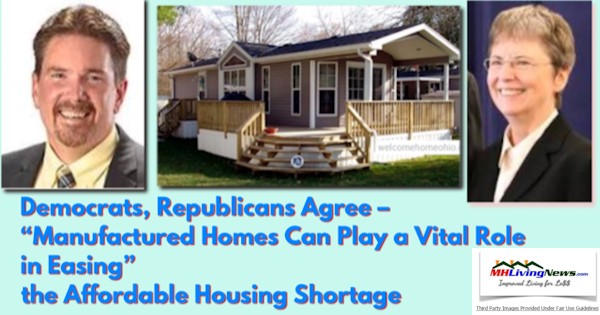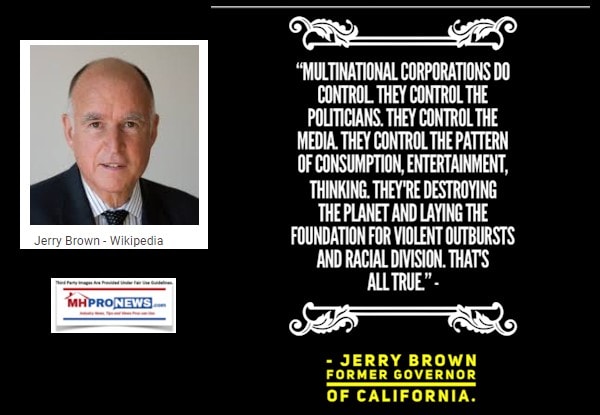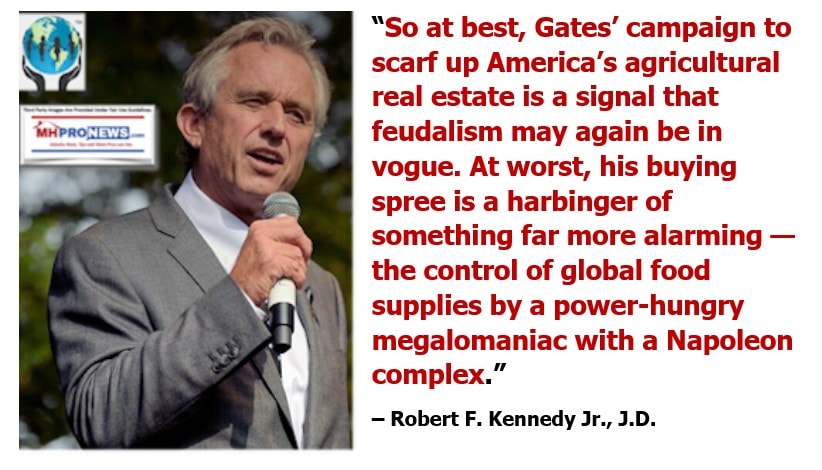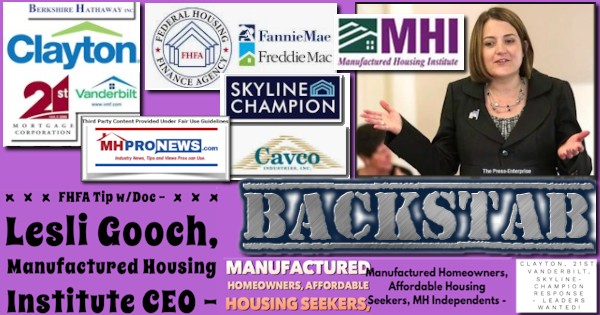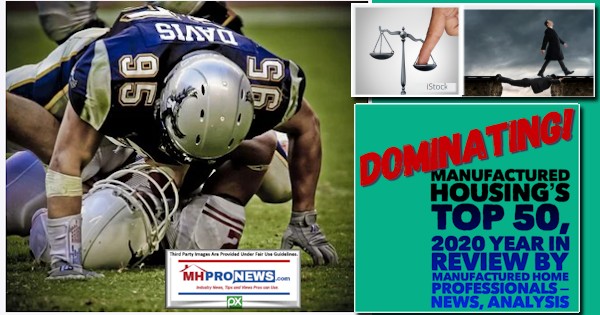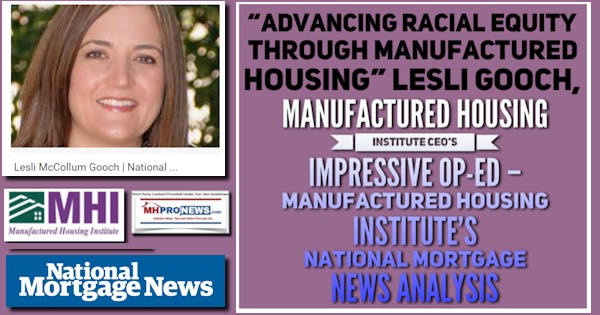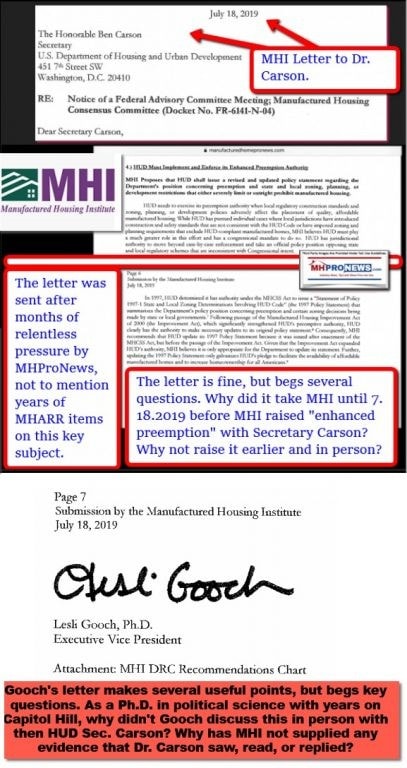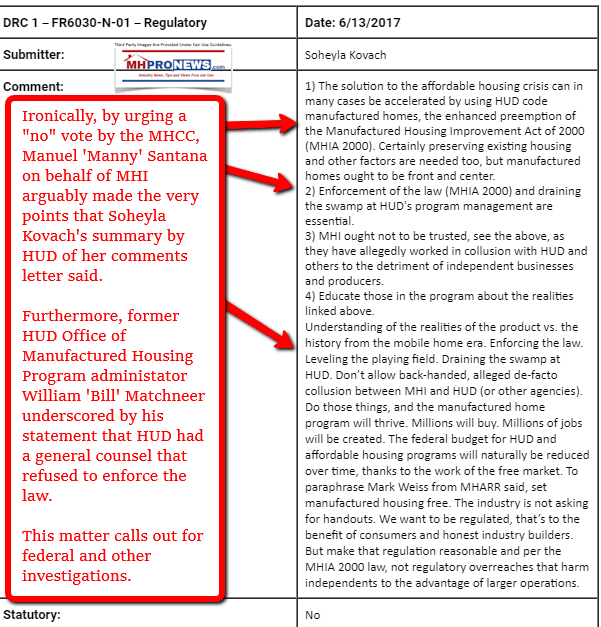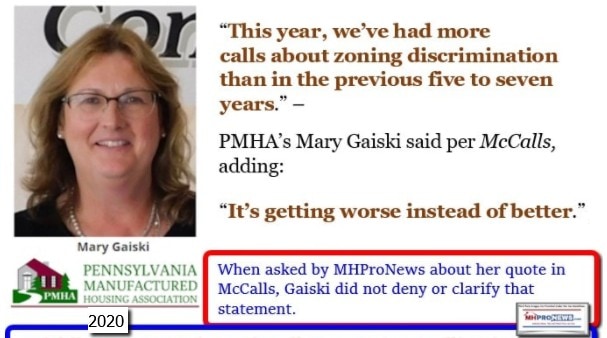“Advancing racial equity through manufactured housing” by Lesli McCollum Gooch, Ph.D., was published on March 08, 2021, 9:00 a.m. by National Mortgage News (NMN). In several respects Gooch’s “Advancing Racial Equity Through Manufactured Housing” is an impressive thought-piece, op-ed or “opinion” article by the CEO of the Manufactured Housing Institute (MHI). This analysis will seek to give credit where it is due, because there are numerous useful statements by her in that document obtained from MHI. Conversely, after her op-ed, MHProNews will unpack aspects of her column that merit closer scrutiny. Why? Because if MHI vigorously and sincerely pursued the thinking she laid out in practical terms, the logical result would be improved image, more opportunities for millions, as well as serious growth in manufactured housing sales. As this is a pro-growth platform – so long as growth is attained ethically and sustainably – reading Gooch’s thoughts and the related expert MHProNews analysis may prove useful to industry professionals, advocates, taxpayers, investors, politicos, media and others in several ways.
With that brief preface, what follows is Gooch’s unedited Op-Ed, as was provided by MHI in a PDF’d document form to their members. It was forwarded to MHProNews for analysis.

MANUFACTURED HOMES
Opinion
Advancing racial equity through manufactured housing
By Lesli McCollum Gooch
March 08, 2021, 9:00 a.m.
As policymakers in Washington seek federal interventions to support racial equity, an important element of the strategy should be increasing the minority homeownership rate. The American Dream of homeownership remains a leading source of wealth accumulation, which means achieving it can result in a meaningful catalyst toward equality. According to the Urban Institute, “the gap in the homeownership rate between black and white families in the U.S. is bigger today than it was when it was legal to refuse to sell someone a home because of the color of their skin.”
Addressing systemic barriers to minority homeownership is imperative and increasing the supply of quality affordable housing must be an integral part of the effort. This is where manufactured housing comes in. Constructed according to a federal building standard that is administered by HUD to ensure quality and safety, manufactured homes are the most affordable homeownership option available. With the average cost of a new manufactured home itself below $80,000, it is not uncommon for the purchase of a manufactured home to be less expensive than the option of renting. And unlike other affordable homeownership options, which are often aging housing stock in need of extensive improvements and rehabilitation, a family can attain homeownership in a brand new home that has the latest innovations, energy efficient features, and modern floor plans and amenities.
The Biden Administration — and incoming HUD Secretary Fudge — have a great opportunity to advance their racial equity agenda by stepping up HUD actions to support manufactured housing. It is the one form of single family housing that is regulated by HUD and the law already requires HUD to “facilitate the availability of affordable manufactured homes to increase homeownership for all Americans.” (42 USC 5401(b)(2)).
To advance racial equity, HUD must stop localities from excluding manufactured homes from their communities, which many have done through actions which range from exclusionary zoning restrictions to outright prohibitions against manufactured homes. The Manufactured Housing Improvement Act of 2000 specifically states that when HUD construction and safety standards are in effect, a locality does not have authority to establish different standards. The statute explicitly states that this preemption should be“broadly and liberally construed” to avoid disparate local requirements. HUD has the authority and duty to pursue more vigorous enforcement of this provision, which clearly establishes federal supremacy for manufactured housing construction.
Unfortunately, due to lax enforcement of preemption by HUD, many localities use construction requirements that deviate from the HUD Code to accomplish an underlying objective of zoning out manufactured housing (or making it prohibitively expensive). To address this, HUD must strengthen preemption enforcement. HUD must provide clearer, more transparent guidelines for compliance, and HUD must respond promptly and definitively whenever localities violate this provision and are called out for such violations.
In some cases, this exclusion of manufactured housing amounts to a violation of the Fair Housing Act. A year ago, the Manufactured Housing Institute (MHI) weighed in with concerns about potential changes to the HUD Affirmatively Furthering Fair Housing (AFFH) rules – offering specific suggestions about preserving the ability under AFFH to prevent localities from excluding manufactured housing from their communities in a manner that violates our federal Fair Housing laws. Ultimately, HUD replaced the AFFH assessment tool with a certification process as part of determining compliance with the fair housing requirement.
While MHI appreciates that manufactured housing regulations and restrictions were listed in the certification process as one of 16 barriers to affordable housing, AFFH compliance rules and the process should be strengthened. The end result should be that local citizens and affordable housing developers (including manufactured housing providers) have sufficient tools and legal authority to contest local actions that violate fair housing by restricting or zoning out affordable homeownership options such as manufactured homes from their community.
COVID has exacerbated racial and economic disparities in this country. It is timely to take action to help reverse this trend in the one area that has been one of the most critical sources of wealth building in this country — homeownership. To achieve racial equity, HUD should take seriously its mandate to support the growth of manufactured housing to increase homeownership for all.
Lesli McCollum Gooch, CEO, Manufactured Housing Institute
##
There are certain issues with the above, but in fairness, on the surface this may be one of Lesli Gooch’s better if not the best op-ed style articles she has had published in mainstream or trade media. More on that will follow in our analysis, linked-referenced examples, and related commentary.

Additional Information, MHProNews Analysis and Commentary on
MHI CEO Gooch’s “Advancing racial equity through manufactured housing”
The first point to stress is that if MHI sincerely and robustly pursued this type of thinking – coupled with parallel efforts to improve financing, placement, and more useful image building – that sort of program could lead to the type of growth potential that prior MHI president and CEO Richard “Dick” Jennison promised the industry about 6 years ago. That 500,000 new HUD-Code manufactured home pledge was made in Louisville, KY, but unfortunately, MHI’s leadership failed to deliver on that claim. Manufactured housing is in its third year of year-after-year declines, finishing 2020 at some 95,000 new homes, or less than 20 percent of what Jennision said was doable six years ago.
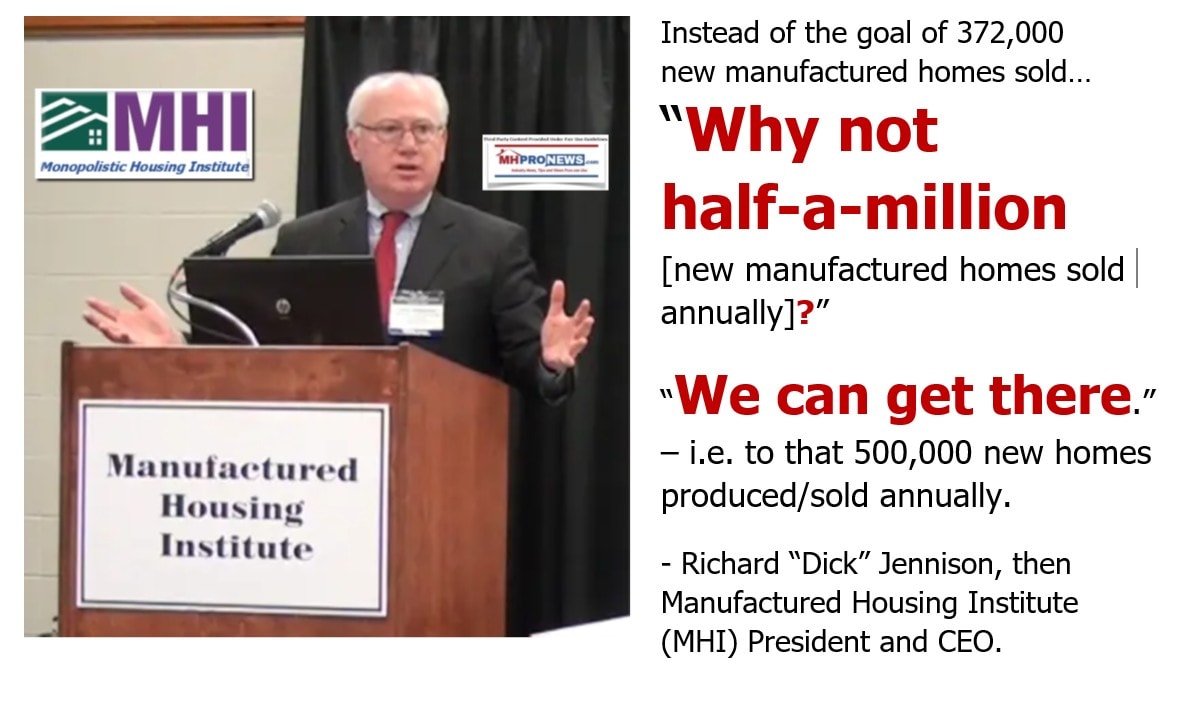
That noted, why would half a-million – or more – new manufactured homes sales annually be possible?
- As Minneapolis Federal Reserve Researchers James A. Schmitz Jr and his associates have observed, the ramp-up and training time in a factory setting can be accomplished far more rapidly than in conventional site-built housing.
- A large part of the public that desires or requires affordable housing are minorities, as well as whites or those of whatever background who either need or prefer an affordable vs. a more costly home. It only makes sense to seek to serve that large and growing part of the population. There are, per the Apartment List, some 111 million Americans living in rentals. Along with all other demographic groups that may want to upsize, downsize or otherwise consider a more affordable manufactured home, the gap between opportunities and reality is stark.
- Unfortunately for Gooch’s thesis, Berkshire Hathaway (BRK) owned Clayton Homes, 21st Mortgage Corporation and Vanderbilt Mortgage and Finance (VMF) have a problematic if not poor reputation with regards to minorities. Who says? The Seattle Times, the Center for Integrity, and several Democratic lawmakers, Minneapolis Federal Reserve Researcher Donna Feir, MHAction, among others.
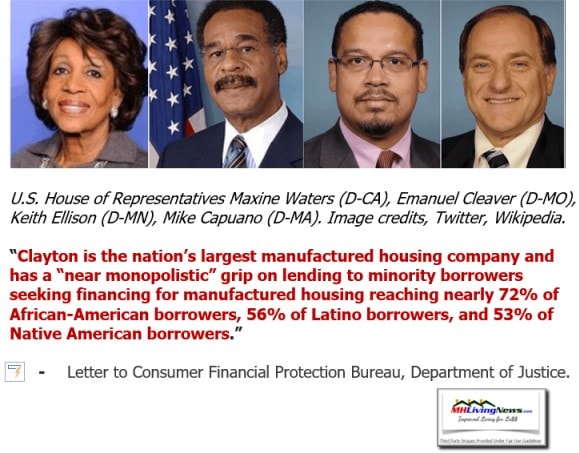
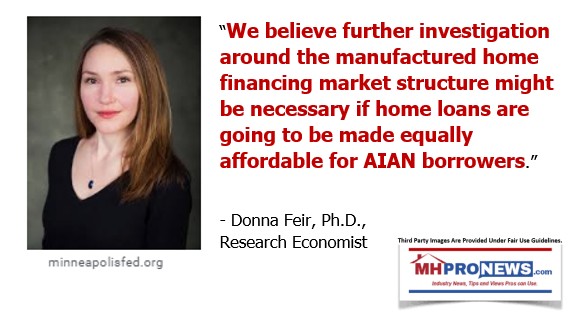

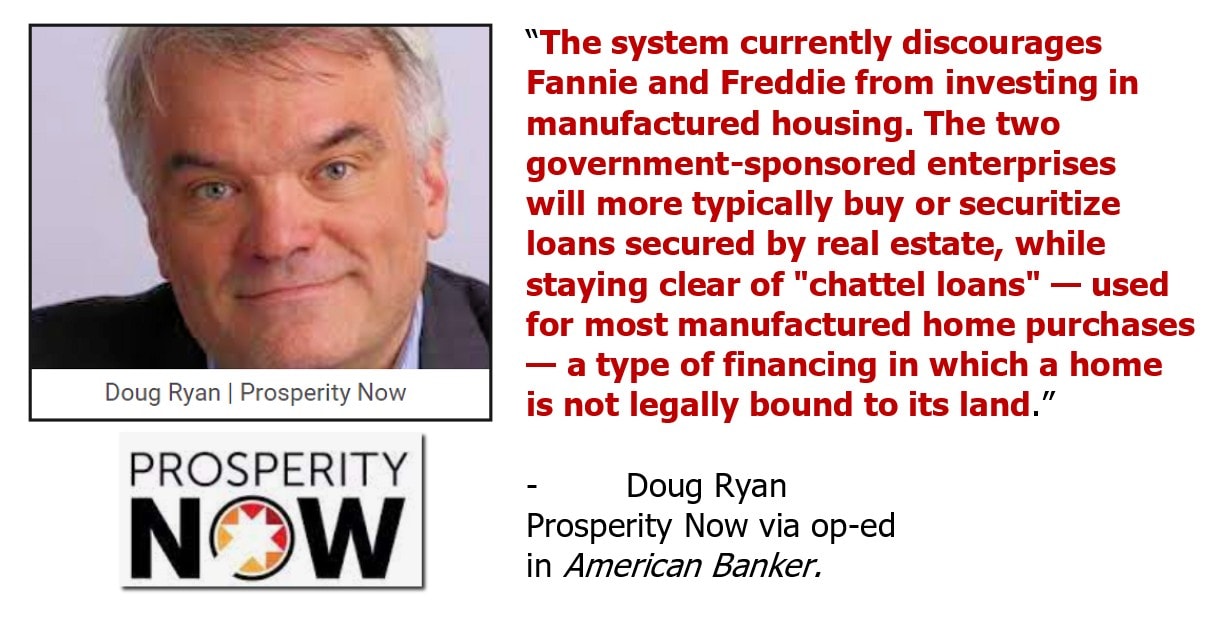
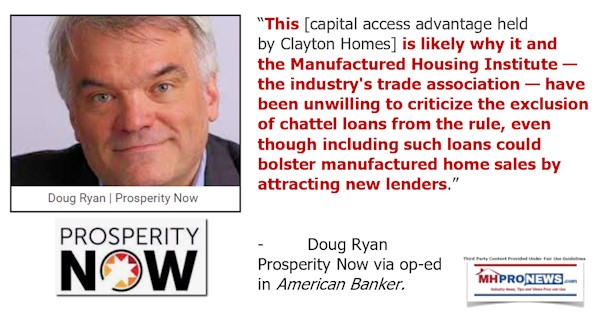
4) Put differently, if MHI was serious and effectively pushing such a program – because MHI is seen by nonprofits and others as dominated by Clayton Homes, 21st, and VMF – it might begin to repair damage caused to the industry’s reputation by Berkshire Hathaway (BRK) owned brands.
5) But it can easily be demonstrated that this seemingly fine letter is just more MHI window dressing. How can that be evidenced? Because if they were sincere in this statement, they could have joined forces with the Manufactured Housing Association for Regulatory Reform (MHARR) years ago to make this stated goal a reality. That is how the Manufactured Housing Improvement Act of 2000 (MHIA or 2000 Reform law) was passed in the first place. MHI teamed up with MHARR to enact policies that MHARR had long wanted. By the way, much of what MHI’s Gooch said, has been said before by Mark Weiss, J.D., the MHARR president and CEO. Only, no credit for years of his previous insights on these related points hit by Gooch were given in her op-ed.
6) To put a fine point on #5, when MHARR sends out an email to members, it is normally posted the same day or the following day on the MHARR website. Anyone can access a MHARR news item or view their MHARR Issues and Perspectives. By contrast, MHI often sends out items via emails, the reverse of what MHARR does is routinely true. MHI’s emailed messages – including documents like the PDF from which Gooch’s letter above to NMN was referenced – are not to be found online on MHI’s own website. That fact pattern strongly suggests they are posturing for members, but hiding it masking that from the public. The screen captures that follow make those respective claims clear.

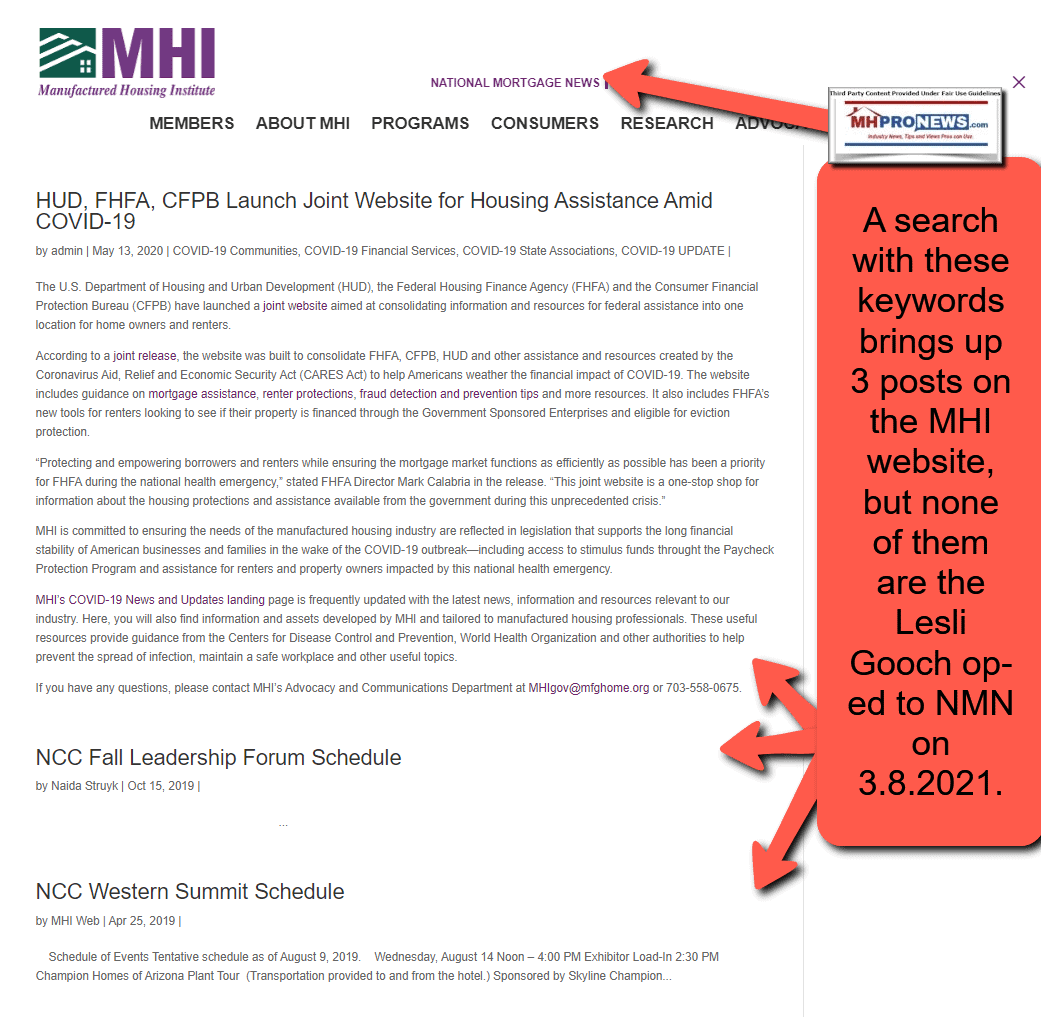

7) MHI’s leaders – including Gooch – have been under increasing pressure from MHARR, MHProNews, and MHLivingNews to actually do what the claim. In July 2019, Gooch arguably used the better phrasing of “enhanced preemption” in a letter to then HUD Secretary Ben Carson instead of just “federal preemption,” as used in the NMN op-ed. That letter is also missing from MHI’s website, just as this letter that references the Biden Administration and HUD Secretary Marcia Fudge is missing from their website too.
8) Specific examples can be shown where MHI could have weighed in during recent years on zoning and placement issues, but per local sources to MHProNews, failed to do so. On several occasions – and in states as diverse as California, Indiana, and Texas – MHProNews did a direct engagement with local municipal officials and/or local media. These were cases where restrictions or outright bans on manufactured homes were being sought or put in place. On not one of those occasions checked did MHI – per locals – get involved. MHProNews directly requested MHI involvement in the case of the Bryan, TX ban – where minorities were directly involved – and still nothing. It should be stressed that MHProNews also asked HUD’s Teresa Payne to get involved. Once more, no response or engagement. Put differently, talk is cheap. Perhaps MHI engaged here or there, if so, they could produce the evidence for that and the outcome. But in a clear case where minorities were involved in Bryan, TX – MHI reportedly did not lift a finger. No call, no email, no effort.

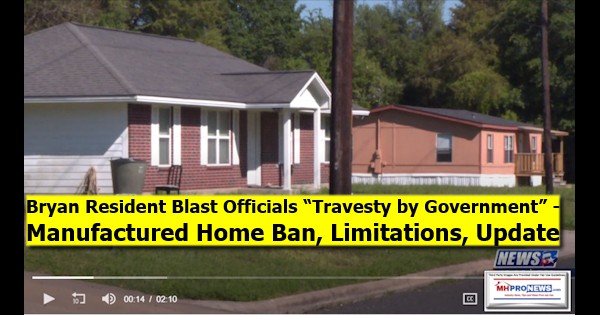

9) Other evidence has been produced – apparently from a tipster inside MHI that sent materials to MHProNews anonymously – that documented an apparent conflict of interest between Lesli Gooch and conventional housing engaged organizations. An MHI source confirmed those documents, and went further suggesting that it was not entirely a secret, and apparently MHI’s leadership where okay with Gooch’s side gig that was in some cases occurring on “MHI time.”


See report, linked here for context on the video above.
10) Near the end of Gooch’s letter, she is demonstrably correct that COVID-19 has made economic and racial disparities broader than before the outbreak of the apparently Wuhan, China originated coronavirus. But where has MHI’s advocacy on that been? By contrast, MHProNews has repeatedly done reports that use third-party documentation that reflects how Warren Buffett, Berkshire Hathaway, Buffett ally Bill Gates and other oligarchs have arguably used the declared pandemic to enlarge their own moat in a manner that increased economic disparities that Gooch decries. More window dressing, Lesli?
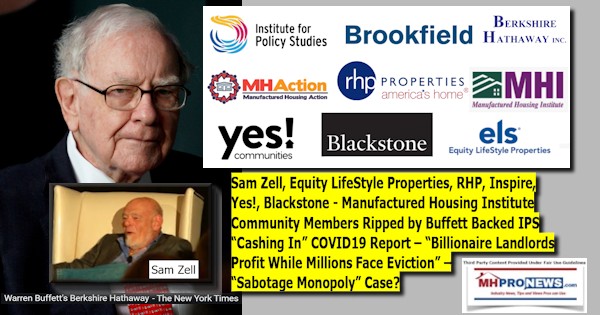
11) There is arguably far more evidence that this her op-ed is little more than fresh smoke and mirrors or ‘razzle dazzle’ by MHI. But let us limit the examples to just a few more instances. One is that Manufactured Home Living News (MHLivingNews) made several of these same arguments about AFFH and the MHIA’s “enhanced preemption in the context of a video interview with the Reverend Donald Tye Jr. Tye is a Black American whose personal and family brings many of the concerns raised by Gooch to life. Tye and this writer made the case in a report with video published on 2018/10/20 that essentially made all of her points and more in a visual context that helped illustrate the principles. What did MHI do to promote that message then? To our knowledge, nothing.
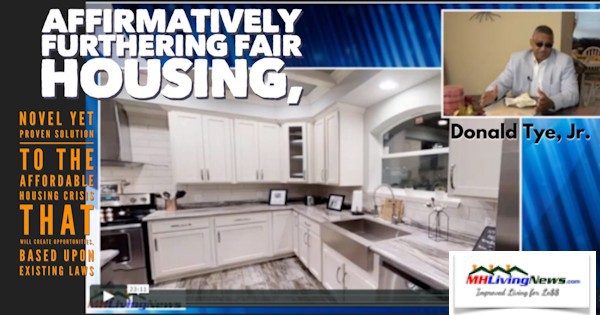
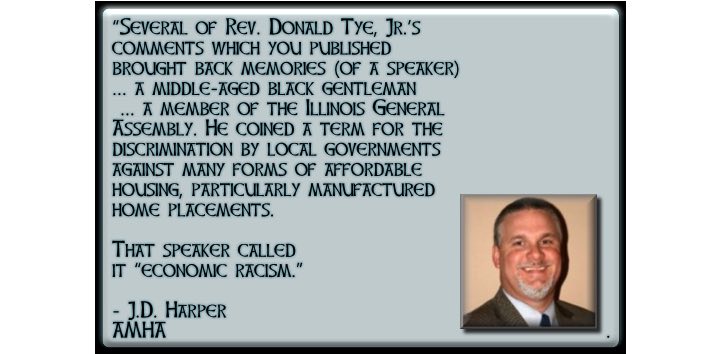
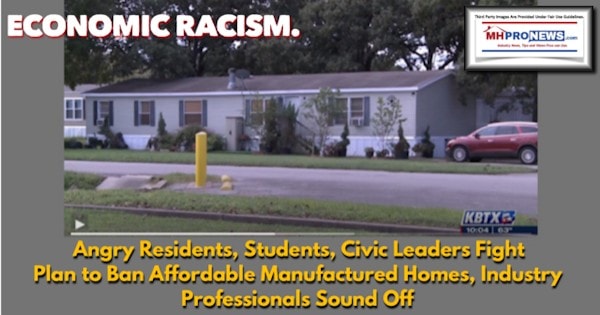
12) More to the point, in an MHCC meeting (see below), MHI members shot down an opportunity to work for implementing some of the very things that Gooch claimed. Perhaps, the argument could be made that she did so because it involved this writer and this platform; so a kind of petty spite? But if someone is serious about advancing an agenda, to apply the wisdom of the affable Ronald Reagan, isn’t someone’s 80-percent friend their 20-percent enemy? Where was Gooch and MHI’s effort to reach across the aisle and implement what Gooch now claims actually evidenced in the past years since the industry entered the Berkshire Hathaway era?
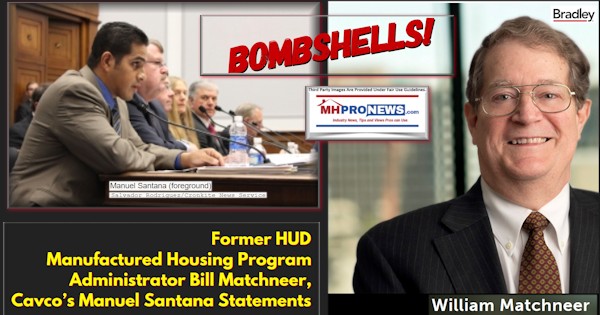
As a lagniappe illustration that makes the case that Gooch is just posturing with this letter is this. There were several opportunities for Gooch and MHI to do this during the Trump Administration. They meet with Dr. Carson several times. There is no known evidence that Carson ever used the phrase “enhanced preemption.” Gooch went to the White House on affordable housing barriers during the Trump Administration. Where was the clarion call by MHI to do what she is now talking about on paper to NMN?
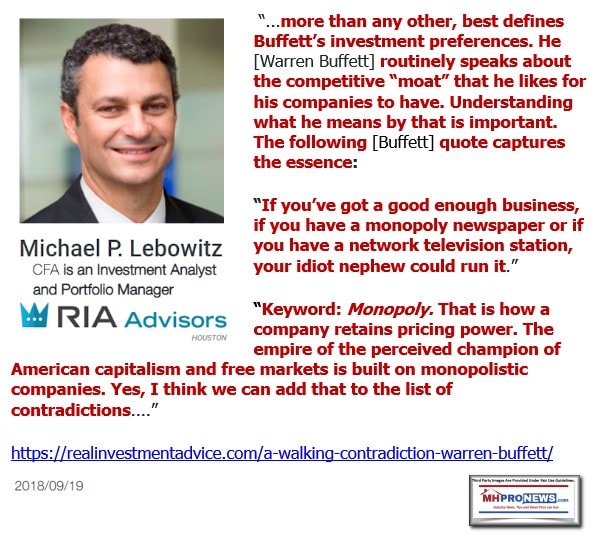
Sadly, the conclusion can easily be reached – based on the evidence and history shown – that MHI is once more posturing for the independents in their audience, and perhaps to investors in their publicly traded firms.
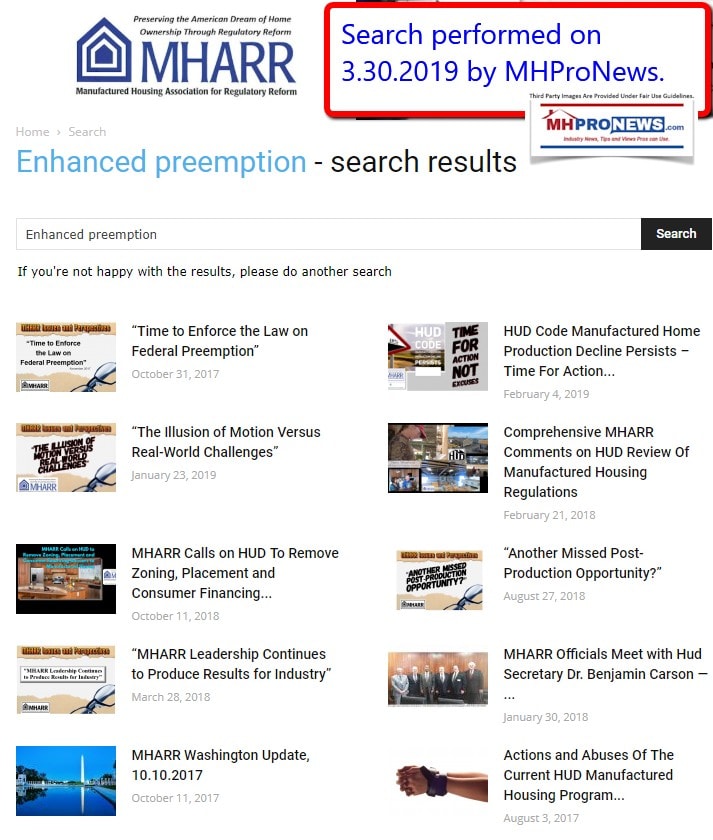
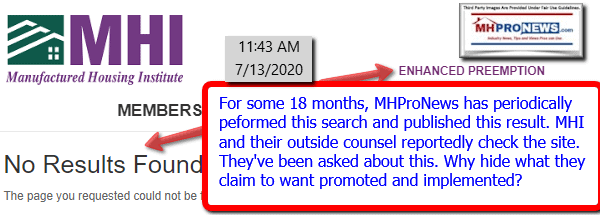
To learn more examples of why this is likely more of a fig leaf than a sincere argument by MHI or Gooch, see the linked and related reports.
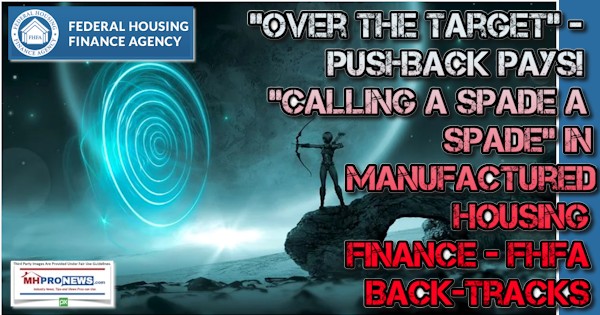
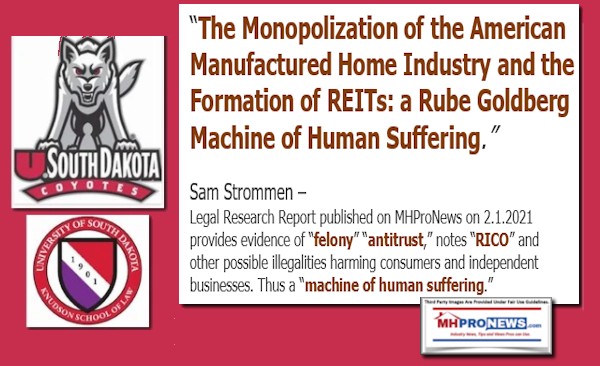
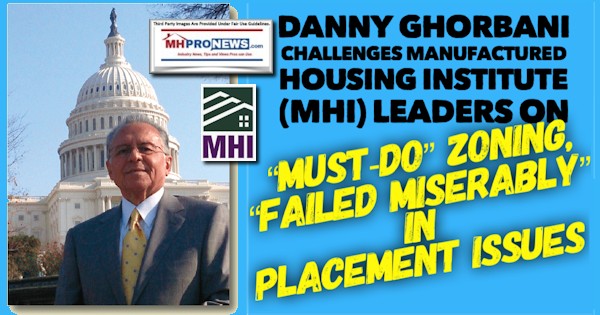
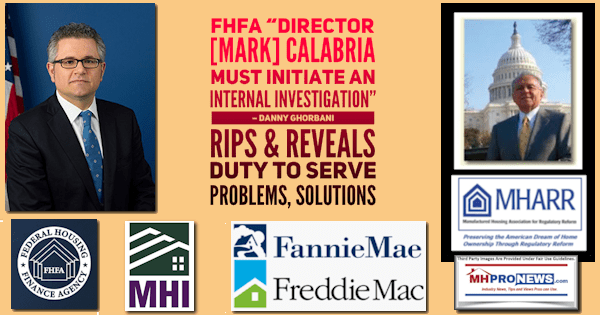
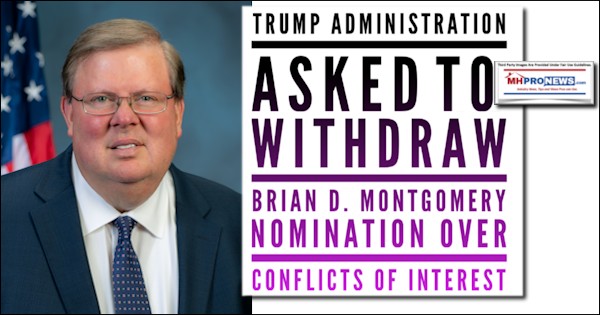

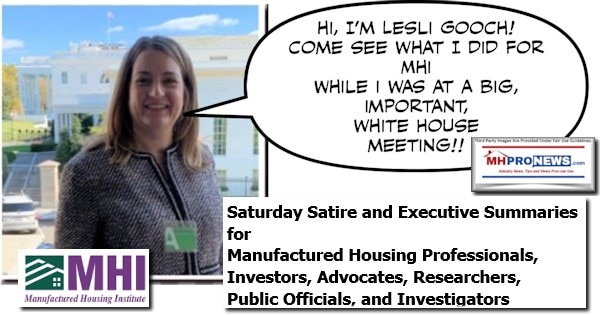
Stay tuned for more of what is ‘behind the curtains’ as well as what is obvious and in-your-face reports. It is all here, at the runaway largest and most-read source for authentic manufactured home “News through the lens of manufactured homes and factory-built housing” © where “We Provide, You Decide.” © ## (Affordable housing, manufactured homes, reports, fact-checks, analysis, and commentary. Third-party images or content are provided under fair use guidelines for media.) (See Related Reports, further below. Text/image boxes often are hot-linked to other reports that can be access by clicking on them.)

By L.A. “Tony” Kovach – for MHProNews.com.
Tony earned a journalism scholarship and earned numerous awards in history and in manufactured housing.
For example, he earned the prestigious Lottinville Award in history from the University of Oklahoma, where he studied history and business management. He’s a managing member and co-founder of LifeStyle Factory Homes, LLC, the parent company to MHProNews, and MHLivingNews.com.
This article reflects the LLC’s and/or the writer’s position, and may or may not reflect the views of sponsors or supporters.
Connect on LinkedIn: http://www.linkedin.com/in/latonykovach
Related References:
The text/image boxes below are linked to other reports, which can be accessed by clicking on them.
